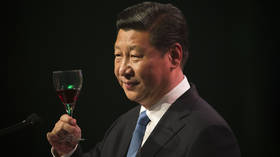Berlin to develop new China strategy – German foreign minister

Germany will develop a new China strategy in the coming months, the country’s foreign minister, Annalena Baerbock, announced on Friday.
Baerbock cited China’s Belt and Road Initiative, arguing that it illustrated why investments in infrastructure were security-related. Issues of sovereignty, territorial integrity, and international law were increasingly prominent in African and South Asian countries, where China had invested heavily in local grids and power plants, she said.
The diplomat went on to stress that the European concept of sovereignty, in contrast, postulated “cooperation where possible and autonomy where necessary.” She added that nations “can only act autonomously when they are not completely dependent on others.” The statement was part of a broader announcement of Germany’s new national security strategy.
Unsurprisingly, Russia’s military action against Ukraine came very much to the fore during Baerbock’s speech. The minister said none of the German officials who had been working on the strategy could have imagined that the Russian president would “attack his neighbor.” She accused Moscow of breaking “our peace order in Europe” as well as the “charter of the United Nations.” In light of that, Germany must more assertively implement some of the core principles “that lead us,” she proclaimed.
Among those principles, she said, was a clear stance that “in questions of war and peace, justice and injustice, no country, including Germany, can be neutral.” She cited the references to her country’s Nazi past made recently by several Russian officials, saying that it was precisely “out of our history, out of Germany’s guilt about war and genocide” that a “special responsibility” arose to always “stand on the side of those whose life, freedom, and rights are being threatened.”
She pointed out that Germany should disabuse itself of the old notion that there were “good and bad dictators.” Berlin and its allies should instead defend their values and stance globally, she urged, but this should not preclude them from talking to authoritarian regimes. And while diplomacy was of great importance, Germany should, at the same time, not allow such regimes to gag it just because it was “dependent in terms of economy or energy.”
The second core principle outlined by Baerbock was an improved ability to act, which she said went hand in hand with international unity, especially within the EU and among G7 and NATO member states.
Last but not least, security policies should go beyond the purview of Germany’s defense and foreign ministries, Baerbock argued. Areas such as infrastructure investment and trade also contributed to the security of the German state, she emphasized. She concluded that, to ensure that security, Berlin would have to become more inventive, pragmatic, and able to “think outside the box.”















